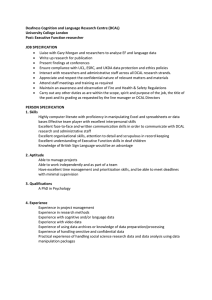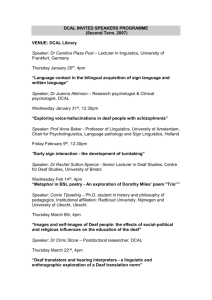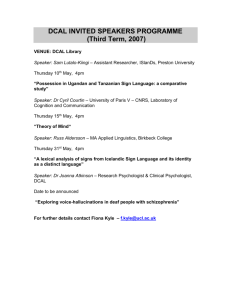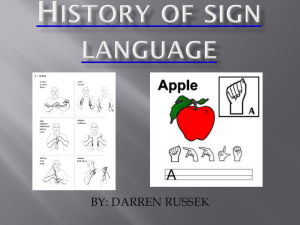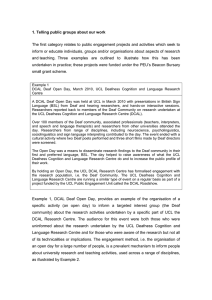eNewsletter Issue 11 – 2012
advertisement
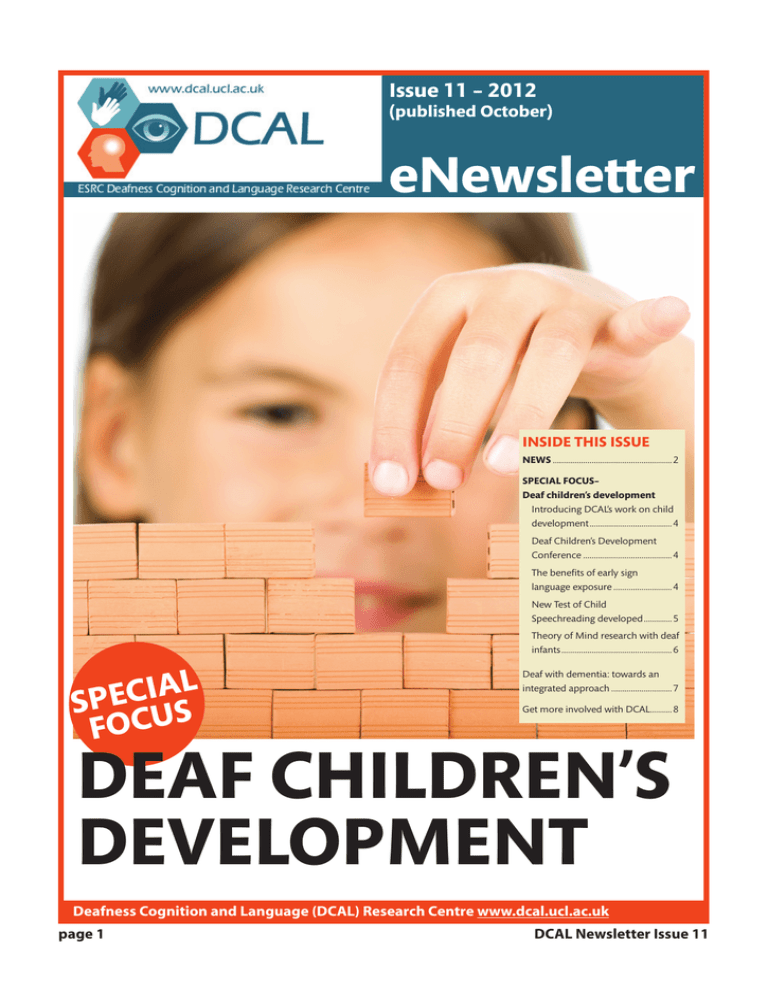
Issue 11 – 2012 (published October) eNewsletter INSIDE THIS ISSUE NEWS........................................................ 2 SPECIAL FOCUS– Deaf children’s development Introducing DCAL’s work on child development....................................... 4 Deaf Children’s Development Conference.......................................... 4 The benefits of early sign . language exposure............................ 4 New Test of Child . Speechreading developed.............. 5 Theory of Mind research with deaf infants.................................................... 6 L A I C E SP US FOC Deaf with dementia: towards an integrated approach............................. 7 Get more involved with DCAL........... 8 Deaf children’s development Deafness Cognition and Language (DCAL) Research Centre www.dcal.ucl.ac.uk page 1 DCAL Newsletter Issue 11 NEWS Successes for DCAL and its associates DCAL nominated for the Signature Organisation of the Year Award Staff from DCAL have been recognised for their outstanding contribution to deaf communication with a nomination for the 2012 Signature Award for the Organisation of the Year. Signature is a charity which promotes excellence in communication with deaf and deafblind people. It has a vision of a society in which deaf people have full access. The awards were set up to celebrate the dedicated efforts made by numerous people to help this vision become a reality. Representatives from DCAL will attend the awards ceremony on Friday 2 November 2012 at Plaisterers’ Hall, London, where the winners of this category and others will be announced. DCAL is happy to be shortlisted alongside Hearing Dogs for Deaf People, Life and Deaf, and the Scottish Council on Deafness. DCAL Director receives prestigious award DCAL Director Bencie Woll is amongst 38 new academics elected to Fellowships of the British Academy at their 19 July 2012 Annual General Meeting. The British Academy is the equivalent of the Royal Society, but for research in the humanities and social sciences. Bencie’s election is a significant achievement, being the first researcher in the field of Deaf Studies to receive this honour. British Deaf Association honours DCAL researcher Frances Elton, Coordinator of Sign Language and Deaf Studies at UCL and associate member of DCAL, was awarded the British Deaf Association (BDA)’s Teaching of BSL (Sign Linguistics) Award at the BDA’s “Francis Maginn” Grand Banquet Celebration held at The Holiday Inn Bloomsbury Hotel in London on Sunday 18 March 2012. Frances is pictured (right) with DCAL Director Professor Bencie Woll at the BDA event. ESRC Future Leader Fellowships for DCAL researchers Two DCAL associates, Dr David Vinson (UCL Cognitive Perceptual & Brain Sciences) and Dr Evelyne Mercure (UCL Institute of Cognitive Neuroscience) have been awarded Future Leader Fellowships by the Economic & Social Research Council (ESRC) from a total of 54 awards made nationally. The scheme aims to support early career social scientists by funding research projects, and providing researchers with an opportunity to develop the skills and experience they need to become leaders in their field. David’s project is “Making sense from the hands and mouth: multimodal integration in spoken and signed languages”. Evelyne’s project is “Influence of early experience of speech and language on their processing and neural representation: a study of hearing infants with deaf mothers”. Deafness Cognition and Language (DCAL) Research Centre www.dcal.ucl.ac.uk page 2 DCAL Newsletter Issue 11 NEWS Press, policy and public engagement work Ground breaking Deaf MEP visits DCAL Dr Ádám Kósa, MEP visited DCAL on Thursday 8 March 2012 and had the opportunity to meet with UCL Vice Provost (International) Professor Michael Worton, DCAL Director Professor Bencie Woll and DCAL researcher Robert Adam. Born in Budapest of Deaf parents, Dr Kósa holds a unique position in the European Parliament, having been elected as its first ever Deaf Member in June 2009. Trained as a lawyer, his first language is Magyar Jelnyelv (Hungarian Sign Language). He is also fluent in Hungarian and English. DCAL Director Professor Bencie Woll said: “As an MEP Dr Kósa has focused a great deal of attention on the status of sign languages in Europe. In 2010 he hosted a conference at the European Parliament which resulted in the Brussels Declaration on Sign Languages in the European Union. The declaration set out principles through which sign language legislation can be brought forward right across the EU.” The DCAL meeting provided opportunities to discuss the importance of public engagement in research and building relationships with government in order to influence policy. It was followed by a presentation from Dr Kósa on the status of sign languages in Europe. Photo (left to right): Dr Ádám Kósa MEP, Professor Michael Worton, Professor Bencie Woll, Robert Adam. DCAL’s advocacy work with UK politicians DCAL research on voice hallucinations features in The Lancet As part of DCAL’s outreach programme to people involved in politics, Stephen Lloyd MP (pictured left), Liberal Democrat MP for Eastbourne, visited DCAL on 12 June 2012 to find out more about its research. During his visit DCAL’s Deputy Director, Professor Gary Morgan and CoDirector Dr Mairéad MacSweeney gave a presentation on deaf children’s development. Stephen is particularly interested in DCAL’s work, having been hard of hearing from childhood. Amongst other present commitments he is one of the Vice Chairs of the All Party Parliamentary Group on Deafness. DCAL’s Dr. Joanna Atkinson’s research into voice hallucinations in deaf people with psychosis was highlighted in a Lancet editorial published on 12 March 2012. The editorial was a commentary on a wider review by the journal on the mental health of deaf people. For more information on the research go to: http://www.ucl.ac.uk/dcal/research/research-projects/schizophrenia Theoretical Issues in Sign Language Research Conference 2013 – call for papers TISLR 11 – the 11th Conference on Theoretical Issues in Sign Language Research will take place in London next year. This is the major international conference in the field and it will be hosted by DCAL on 10th -13th July 2013. The TISLR 11 call for papers is now open and prospective authors are invited to submit an abstract of up to 500 words (+ 1 optional page of references, examples, and/or figures if necessary) by 31st October 2012, 11:59pm. To read more go to http://www.ucl.ac.uk /dcal/tislr/ Deafness Cognition and Language (DCAL) Research Centre www.dcal.ucl.ac.uk page 3 DCAL Newsletter Issue 11 special focus Deaf children and development A considerable amount of DCAL’s work focuses on research that is improving outcomes for deaf children. DCAL explores how deaf children acquire and use language, as well as how their brains develop. Using this information DCAL can help the parents of deaf children and people who work with deaf children develop tools and strategies to ensure that the children get the best start in life. On the following pages you can read more about some of DCAL’s current research relating to deaf children and development. Deaf Children’s Development Conference O n 11 September 2012 DCAL hosted a conference on Deaf Children’s Development at City University, Northampton Square, London. It was open to all with an interest in the subject and was entirely free. Invited speakers included DCAL directors and other leading experts from the fields of child development, education and mental health. The day included a speakers’ question Key facts about deaf children ●Around 1 in 600 deaf babies are born in the UK every year ●90-95% of deaf children are born to hearing parents, the vast majority of whom do not have sign language skills ●Deafness is not a learning disability, yet 65% of deaf children in England fail to achieve five GCSE grades A*-C (including English and maths) ●Deaf children are 60% more likely to experience mental health problems compared to other children and answer session with the chance for attendees to ask their questions and also give their opinion on where DCAL should take its research in the future. There were also information stalls, research demonstrations and refreshments, and BSL interpreters were available all day. Over the last six years DCAL has been at the forefront of researching the key issues that impact on deaf children: from understanding how they acquire language and reading skills to gaining a better understanding of how deaf children learn to think about the world and how their brains develop. DCAL planned the conference to be an opportunity to bring this research to the widest possible audience in an accessible way and to be of special interest to Teachers of the Deaf, Speech and Language Therapists, Audiologists, other professionals working with deaf children, parents of newly identified deaf babies, and parents of deaf children; as well as all d/Deaf or hearing people interested in finding out what DCAL is about or to get up-to-date with the centre’s latest research. Read more at the Deaf Children’s Development Conference blog: https://blogs.city.ac.uk / deafchildsdevelopment/ Early sign language exposure benefits deaf children A ccording to new research, acquiring sign language from an early age in addition to spoken or written language has significant benefits for deaf children. DCAL researchers Kearsy Cormier and David Vinson, with colleagues from La Trobe University and the University of Crete, have examined the effects of age of sign language acquisition in deaf adults who use British Sign Language (BSL). The study showed that adults who developed sign language skills from birth had better grammatical judgment in BSL. Adults who reported learning BSL from the ages of 2 to 8 years found it harder to acquire the same language skills. For those who learned BSL after age 8, a different pattern was apparent. These signers were accurate in responding but took a long time to make their responses. Overall, the research suggests that learning both a sign language and a spoken or written language will be the most beneficial for children to make the most of their linguistic skills. continued on page 5 Deafness Cognition and Language (DCAL) Research Centre www.dcal.ucl.ac.uk page 4 DCAL Newsletter Issue 11 continued from page 4 A bilingual approach can maximise linguistic and cognitive skills to overcome any delays or difficulties due to deafness. The advantages of early sign language exposure in particular remain clear even with rapid advances in hearing aids and cochlear implants. Kearsy Cormier said: “Our research has shown that to give deaf children the best chance of successful language acquisition it is important that they are exposed to a sign language from a very young age. Evidence has shown it is not appropriate to wait until a child has succeeded or failed at acquiring spoken language before introducing a sign language because by that time it may be too late for any successful language acquisition. Since we already know bilingualism has a range of benefits, we would advocate that deaf children be given the opportunity to become bilingual in a signed and spoken/written language as early as possible.” The research has implications for how parents of deaf children are supported to ensure their children have a bilingual start to life. This is particularly important as 90-95% of deaf children are born to hearing parents who have little or no experience of deafness or sign language. The Study - First Language acquisition differs from second language acquisition in prelingually deaf signers: Evidence from sensitivity to grammaticality judgment in British Sign Language - was published in the journal Cognition and is available from DCAL on request. Read my lips – advances in speechreading research with deaf children S peechreading is the term used by researchers to refer to lipreading. ‘Speechreading’ is preferred to ‘lipreading’ because lots of information is used from all of the face, not just the lips, when you watch someone speak. For deaf people, this can be their primary route to speech information. Hearing people also make great use of visual speech, although they often don’t realize it. If you think of talking to someone in a noisy bar, a hearing person is much more likely to understand a person if they can be seen. This is where the old joke ‘I can’t hear you without my glasses on’ comes from. speech. The researchers found that unlike adults, deaf and hearing children had similar levels of speechreading skill. This pattern suggests either a decrease in speechreading skill in hearing children after the age of 14 years relative to deaf children, or, more likely – that as deaf people get older and go through adolescence and into early adulthood – their speechreading skills improve with greater practice and reliance on visual speech, relative to hearing people. Further research is needed on the age group not yet tested by the TAS and the ToCS (14-18 year olds) to find out what happens to speechreading skills in this stage of development. DCAL researchers have previously developed a Test of Adult Speechreading (TAS; Mohammed et al., 2006). This computerised test was specially designed for deaf adults and did not require any reading or writing responses, unlike many previous tests. Deaf adults (18-60yr olds) performed better than hearing adults on this test. In addition, how well deaf people performed on the speechreading test was correlated with their reading skill. The research with children also demonstrated, just like the adult data, that there was a positive correlation between speechreading and reading skill. This was found not only in deaf children, but interestingly, also in hearing children. Now, DCAL researchers have developed a similar test for children: the Test of Child Speechreading (ToCS). A total of 86 deaf and 91 hearing children were tested aged between 5 and 14 years. Children were assessed at different levels: single words, sentences and connected Further research is planned by the team to further examine the relationship between speechreading and reading in deaf children. A copy of the research – to be published in the Journal of Speech, Language and Hearing Research - can be requested from Dr Mairéad MacSweeney, at m.macsweeney@ucl.ac.uk . Deafness Cognition and Language (DCAL) Research Centre www.dcal.ucl.ac.uk page 5 DCAL Newsletter Issue 11 “ What do you think the girl wants from Father Christmas?” – Theory of Mind research with deaf infants D CAL Deputy Director, Professor Gary Morgan, and other colleagues from DCAL and City University London have been working with researchers from the University of Sheffield, University of Trento and University of Gothenburg, on a joint project investigating early interaction involving British and Swedish hearing parents and their deaf and hearing 2-3 year old children. This research is the first to show that conversational input about mental states directed towards very young deaf children differs significantly in those areas of interaction thought to be crucial for Theory of Mind (ToM) development. ToM is the reasoning that enables us to reflect on the mental states of others. Importantly it contributes to sophisticated forms of human interaction and provides a basis for understanding others’ actions and dispositions. The project focused on “mental state conversations” and the quality of “conversational turns”.The aim was to identify if there are differences in the way in which parents communicate with deaf children and with hearing children, and from this understand more about the possible effects of parent-child interaction on deaf children’s socialcognitive development. Mental state language relates to cognition (e.g.“think”,“know”), emotions (e.g. “happy”,“worried”,“bored”), and desires (e.g.“want”,“like”,“don’t like”, “hope”). Conversational turns refer to the way in which children and parents interact: how communication is initiated and connected, or alternatively, fails or is unclear. With data from around 50 children, the research showed that there was a general lack of mental state conversations with the deaf children (e.g. questions like “what do you think the girl wants from Father Christmas?” when looking at a picture). In both the Swedish and British samples studied, parents of young hearing children used far more cognitive mental state language and their conversations were characterised by more effective turn-taking compared to parents of deaf children. The research team suggests these differences in content and connectedness of interaction may contribute directly to the substantial delay in the expression of ToM reasoning that has been identified in older deaf children through other research projects. Research by other groups has found that deaf children aged 4 years and above who come from hearing families where sign language is not used effectively display a protracted delay in the development of ToM reasoning. This delay does not extend to other areas of the children’s cognitive development and is not found in deaf children from deaf families, who are exposed to a sign language from birth. The research is especially important given that 90-95% of deaf children are born to hearing parents, the vast majority of whom have no, or only limited sign language skills. Meanwhile ToM in typically developing hearing children has also been linked to the importance of early learning through family conversational input about mental continued on page 7 Deafness Cognition and Language (DCAL) Research Centre www.dcal.ucl.ac.uk page 6 DCAL Newsletter Issue 11 continued from page 6 states before language is acquired. Other research work by the same group has suggested all infants have a core ToM understanding as indicated by their performance on tasks where the child’s looking behavior is recorded rather than requiring an explicit response. The key issue concerns what input is required to trigger the expression of ToM. The aim is that by examining conversational interaction between hearing parents and deaf infants this new research may help to identify the origins of subsequent ToM impairments in deaf children. One implication of the research is that early intervention for families with deaf children should include encouragement for parents to engage their young children in conversation about the mind, whether in spoken language or sign language. For a full copy of the research paper Belief attribution in deaf and hearing infants. Meristo, M., Morgan, G., Geraci, A., Iozzi, L., Hjelmquist, E., Surian, L., & Siegal, M. (2012) please visit http://www.staff.city.ac.uk /g. morgan/recent% 20publications. htm UPDATE Deaf with dementia: towards an integrated approach R eaders of previous DCAL newsletters will be familiar with the Deaf with Dementia research project and will have been able to follow its progress over the last couple of years - from the initial data collection in order to establish norms with older deaf people, to being able to offer screening tests that can help identify the cognitive changes associated with dementia in deaf people who use BSL. Before this project, tests for dementia have only been relevant to hearing people or those people who acquired deafness in later life. This important development for Deaf people gives health professionals the ability to properly assess Deaf patients for dementia on an equivalent basis to what is offered to hearing patients for the first time. The other partners in the project are now involved with research around appropriate care provision for Deaf people living with dementia, and DCAL has been carrying out advocacy work with a range of stakeholders. The aim is to ensure decision-makers understand the need to consider the specific needs of deaf people who have dementia and other neurological conditions. As part of this advocacy programme DCAL has produced a Briefing Sheet titled “Deaf with dementia - from misdiagnosis and isolation to a future of good practice”. Anyone who would like a copy of this two-page sheet to share with family members or health professionals can request one by emailing DCAL at dcal@ucl.ac.uk. For further detail on the Deaf with Dementia project go to the University of Manchester website at: http://www.nursing.manchester.ac.uk/ deafwithdementia/ Background It is estimated that 670,000 people in England have dementia, but that 42% of those with dementia do not have a diagnosis. This represents 400,000 people who do not know they are living with the condition. For Deaf people this percentage is estimated to be much higher. There is a direct relationship between hearing loss and dementia. Hearing-impaired and deaf people are five times more likely to have dementia compared with the hearing population. Also dementia and hearing loss can cause similar symptoms, such as social withdrawal. This means that hearing loss can make the diagnosis of dementia more challenging, and vice versa and the effective management of hearing loss can improve the quality of care experienced by people with dementia. It is therefore essential that health and social services take an integrated approach that accounts for both dementia and sensory loss to reach an accurate diagnosis and ensure appropriate care. Different approaches will be required depending on individual needs – if someone has age-related hearing loss or if they are profoundly deaf and British Sign Language is their preferred language. The Deaf with Dementia (DwD) project is supported by the Alzheimer’s Society. The project is a partnership between the University of Manchester, the Deafness Cognition and Language (DCAL) Research Centre at University College London (UCL), City University London and the Royal Association for Deaf People (RAD). Deafness Cognition and Language (DCAL) Research Centre www.dcal.ucl.ac.uk page 7 DCAL Newsletter Issue 11 GET MORE INVOLVED WITH DCAL New website launched DCAL’s website has been improved and made more accessible. Go to www.ucl.ac.uk /dcal and click on the different sections that interest you. There’s in-depth information about DCAL’s research, news about academic conferences and public events, courses for deaf professionals and more. Volunteer to take part in our research and win a shopping spree! Love shopping? Would you like the chance to treat yourself or someone close to you? Then sign up for DCAL’s volunteer research participant database and every three months you have the chance to win £25 of Love2Shop vouchers in a special volunteer raffle. The raffle is a little fun thank you to people who would like to take part in DCAL’s research projects. Everyone is invited who is connected to the deaf or signing communities in some way. Research participation can involve deaf signers and also deaf non-signers, and also hearing people who have learnt to sign at any age, not just from birth. Volunteering your time occasionally is a great way to help DCAL achieve successful outcomes with its projects that aim to improve life for d/Deaf people. Volunteers say they like contributing to this important work and enjoy the challenge of the tasks as well as the social interaction with the DCAL team and other volunteers. You will be asked to fill in a very brief questionnaire which helps us know if you are suitable for future projects. If so, a DCAL researcher will contact you with further information and invite you to take part. The research tasks are straightforward and interesting and there’s no obligation if it doesn’t suit you to join in just then. DCAL adheres to a strict code of conduct and ethics in its work, and of course this includes all research participants too. All information is treated as strictly confidential. As DCAL researchers travel all over the country to carry out data collection, volunteers are welcome from everywhere. So get in touch and then you can start planning your shopping trip! Love2Shop vouchers are accepted at 20,000 stores across the UK including Argos, Boots, Debenhams, Matalan, Toys ‘R’ Us, HMV and Mothercare. Previous winners! Recent winners include Michelle Oldale and Joanne Pickersgill. James Kelberman from Purley was one of our earlier winners. He headed off to Bluewater shopping centre with his voucher. Congratulations all! You can join the DCAL volunteer database on our website at: http:// itservices.psychol.ucl.ac.uk/DCAL/ Deafness Cognition and Language (DCAL) Research Centre University College London, 49 Gordon Square, London WC1H 0PD Telephone +44(0)20 7679 8679 Minicom +44(0)20 7679 8693 Fax +44(0)20 7679 8691 Website www.dcal.ucl.ac.uk Deafness Cognition and Language (DCAL) Research Centre www.dcal.ucl.ac.uk page 8 DCAL Newsletter Issue 11
